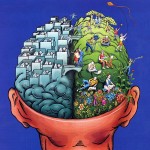How To Learn German From Scratch To a B2 Level In 5 Months: A Case Study

It’s amazing to see what kind of a heated debate a potential speed of learning can sparkle. A couple of weeks ago, I was reading a post on Reddit titled:
Here are some of the answers.
You need to speak with native speakers. The only way to truly advance in a language is to speak with people. Taking classes can help you form a base but to advance to a level of proficiency you need to study and practice everyday in your own life. Most of the time, I feel language classes are too slow.
Common Learning Myths – to Learn a Language in 6 Months, You Have To:
1) Live, breathe and sniff a language around the clock.
This advice is as great as it is unrealistic unless you want to get a first-class ticket to the “burnout” town with intermediate stations at “I-start-hating-languages” and “No-I-can’t-grab-a-beer-with-you-because-I-must-learn,” of course.
2) Be an experienced learner
It’s impossible not to agree with this point. Language learning veterans certainly enjoy a faster learning curve with every next language they learn. However, I would argue that often it is so, simply because they have developed a language learning routine.
3) Give up and cry deeply
Some background and introduction
Initially, I wanted to write this article in the form of an interview. However, I quickly changed my mind. It would leave dozens of bigger and smaller questions unanswered. Not to mention – most interviews are boring. So it’s more of a hybrid.
I think that this format should allow you to get the most value out of it. Let’s get to know a bit of something about our language hero.
1) Tell us first about yourself: I am 26 years old and a doctor intern (a soon-to-be hematologist).
2) What was your previous experience with languages before our mutual challenge – Learning English from the age of 12 – private and regular school lessons. It definitely didn’t go swimmingly. I actually considered myself to be linguistically retarded. Sometimes even my native tongue (Polish) seems to be problematic.
3) How much time did you need to achieve a B2 level in English – Over 10 years, I think.
As you can see, Mathew had almost no language experience. What’s worse, he considered himself to be bad at learning languages.
What makes a good student?
I have taught many students throughout the years. Even though most of them learn relatively fast and achieve B1/B2 level in about 12 months, just a few of them get to B2 level in 4-8 months.
Some character traits make them unique.
1) being motivated
Without it, most people wring their hands and give up upon suffering the first major setback. That’s why you need it so much at the beginning.
Mathew’s motivation was apparent and specific. He wanted to learn German asap to “have an opportunity of doing my medical specialization in Switzerland.” That allowed him to bounce back from every obstacle he encountered.
Of course, you should be aware that motivation alone doesn’t suffice. You need to create habits and build learning systems as quickly as it is only possible.
Another trait which can help you with that is:
2) being disciplined
It’s the prerequisite for effective learning.
I mean, how else are you going to follow through on our plan? Luckily for you, you don’t need to be disciplined by nature. You can awaken this trait by betting. (read more about it here).
Mathew’s workload was considerable. I knew that at some point, he would say, “that’s enough. I deserve a break”. I mean, who wouldn’t? I made sure that his motivation to keep maintaining his learning pace was sufficient.
How?
We made bets. Failing to do his daily tasks would cost him dearly. Understandably, he was able to resist the temptation to bum around.
The last character trait which a good student should possess is:
3) being coachable
How to Learn German from Scratch to a b2 Level in 5 Months – How Much Time Was Needed
Before we move on to Mathew’s total learning time, let’s put things in perspective and answer the following question first.
How much time do you need to learn German to a B2 level?
A quick google search shows that The Foreign Service Institute (FSI) suggests that you need about 750 hours to get to this level.
An offer of many German-language schools seems to confirm this number. Usually, you need to spend about 500 – 700 hours in a course and then add about 100-200 hours for learning at home.
It’s worth remembering that these numbers may vary depending on your mother tongue and knowledge of other languages. But as for our case, they certainly look solid.
How many words do you need to learn German to a B2 level?
People who take B2 exams are usually expected to know anywhere between 3 and 4,5 k words.
How much time did Mathew need to learn German to B2 level?
For five months, we met, on average, two hours per week.
Yes, just two hours per week. Funny enough, that contrasts starkly with intensive courses where you have to spend about 30 hours per week at your language school. Of course, he also learned at home. On average, he learned about 3 hours each day (including our meetings).
The total time he needed to get to B2 level amounts to
150 x 3 = 450 hours.
For a rookie who knew just one foreign language before he decided to take on this challenge, it’s undoubtedly impressive.
But what’s even more impressive is Mathew’s vocabulary size after five months. Altogether, he learned about 6700 words (yep, we counted).
That means that vocabulary-wise, he surpassed most of the requirements for this level. He could read most of the things he wanted to, including newspapers, and could also speak about a variety of subjects.
Although it was apparent that his vocabulary wasn’t fully consolidated at this point since he had to struggle for quite a few words.
Learn German From Scratch To a B2 Level In 5 Months – Mathew’s results
Initially, our goal was to get to a B2 level in 6 months so Mathew could take the B2 Goethe exam and ace it. Interestingly, he managed to do it in 5 months! Here is his pride and joy:
Results are not bad, but I expected them to be much higher. Mathew had a firm grasp of the language. I guess that in the end, stress got to him as he had no previous experience with such exams.
Learn German From Scratch To a B2 Level In 5 Months – A Study Plan
I decided to break everything down for you so you can, hopefully, follow this plan.
Materials
We only used four things
- ANKI
- a pocket dictionary
- a grammar book
- a grammar cheat sheet
That’s it. There is power in simplicity.
Learn German From Scratch To a B2 Level – The first 2 weeks
During first four hours I taught Mathew
- how to use ANKI and why it is effective
- all the functional Grammar (i.e., Grammar which you need to communicate with others)
- how to choose your daily goals so you know that you will achieve a given level within the desired timeframe
- first memory system so you could utilize ANKI more effectively
No listening and no reading
I think that the things mentioned above are quite clear. What might not be that obvious is why
I forbade Mathew to read and listen to anything for the first three months.
“Why?!” I can hear you screaming! It doesn’t make any sense! Or does it?
If you know how to acquire vocabulary, you do not context to do it. You can learn the first 3-5 thousand words directly from frequency lists. It allows you to save a lot of time simply by not being forced to go through all those crappy dialogs in textbooks.
What’s more, most people assume that you need to start listening to your target language right away. That’s, forgive me for being so blunt, moronic. If you only know 200 or 600 words and almost no grammar, how much of the return rate can you get from one hour of listening?
Sure, there is some value in it – you can get used to the prosody and so on, but all in all, it’s not worth it.
No conversational partners
Ok, so that might be another thing which might seem bizarre to you – Mathew had no other conversational partners besides me. Not that it was forbidden or anything, his schedule was too hectic to find any people who would be willing to conform to it.
So yes, as weird as it may be, there is a good explanation of why it didn’t influence Mathew’s progress negatively. What people fail to understand that conversations require two things from you:
1) Understanding
If you listen a lot, even without any magical techniques, the day will come when you will be able to understand what is being said (assuming that you practice your grammar and vocabulary).
2) Being able to express yourself
This is usually the result of two things
- having a good command of grammar
- learning and activating words
Do you need a lot of conversational partners to do it?
Of course not!
Learn German From Scratch To a B2 Level – Weeks 2-12
Speaking
After the first two weeks, we dove right into speaking. It was something new for him as he said, ” our conversations started after just a few hours, and surprisingly, they were not trivial but revolved around many topics.”
Usually, we started every lesson in the same way. First, I asked him to tell me what he did last week/weekend so he could activate past tenses. He also had to ask some questions using the grammar constructions we had covered so far.
Once again, it might seem strange, but keep in mind that most of the time, students talk far more often than they ask questions. Thus, the imbalance ensues.
In extreme cases, someone might be able to talk quite fluently and still not be able to ask a question without hesitation. This can cripple almost any conversation.
Teaching Mathew how to activate his vocabulary
Of course, if Mathew had a chance only to speak with me, he wouldn’t get far. That’s why I taught him some other methods to activate his vocabulary and practice his fluency.
Among others, I taught him how he could talk with himself at home (more about it here).
The main focus – vocabulary acquisition
The main focus during this period was learning as many words as possible. On average, Mathew learned between 35-40 words each day.
Learn German From Scratch To a B2 Level – Weeks 12-16
Listening and writing
It was the time when Mathew started reading a couple of articles per week, as well as listening to News in Slow German for at least 30-40 minutes each day.
As you probably recall, he didn’t listen to anything or anyone else but me for the first months. Understandably, his comprehension, at the very beginning, was very low. He could get only
about 20-25% of what he heard during the first couple of days. But what happened next blew his mind.
His comprehension rose to about 80 % within 2-3 weeks. After that, he switched to listening to the regular German radio.
Were his listening skills perfect when he took his exam? Of course not. They are always one of the most challenging things to improve. But as you could see, they were good enough to pass a listening part of the test.
Utilizing passive learning
Active learning is undoubtedly the most powerful language learning tool one might use. But it always works better when you combine it with passive learning.
That’s why I taught Mathew how to surround himself with a language to get even more out of his studies.
Learn German From Scratch To a B2 Level – Weeks 16-20
It was the most boring period of our preparation. In addition to doing all the previously mentioned things, I started teaching Mathew how to solve and approach all the parts of the exam. It doesn’t sound exciting, but it’s a crucial element if you want to pass a certificate. You need to create a habit of solving different examination parts in a particular manner.
It’s worth mentioning that we used some basic mnemonics to improve Mathew’s presentation skills. Being able to quickly memorize a rough plan of what you would like to say helps to take the edge off.
How To Learn German From Scratch To a B2 Level In 5 Months – Summary
As you can see, rapid learning is undoubtedly doable even if you want to learn German from scratch to a B2 level in 5 months or faster. I have done it with dozens of students using the outlined strategy, and results are always great.
Of course, it might not be easy to start applying it to your learning right from the start. After all, it requires a little bit different approach to language learning than the one which is commonly accepted, but it works like a charm.
If you ever replicate this strategy, please drop me a message and let me know how it went.
Happy learnings!
Vocabulary Labs
Interested in all the methods and strategies that we have used to learn German within that time? Check out my language course Vocabulary Labs. You can read dozens of similar testimonials here. It has been used by hundreds of learners to master over 40 different languages.
Done reading? Time to learn!
Reading articles online is a great way to expand your knowledge. However, the sad thing is that after barely 1 day, we tend to forget most of the things we have read.
I am on the mission to change it. I have created over 20 flashcards that you can download to truly learn information from this article. It’s enough to download ANKI, and you’re good to go. This way, you will be able to speed up your learning in a more impactful way.
















Hey , Hope you are doing well and thank you for this wonderful series of articles .
I wanted to try it out on my own. I have understood from the comments and the articles that the best (or one of the best ) method would be to form my own flash cards with sentence formation as the method of encoding . But which frequency list should i go for , for german ? are there any credible sources of frequency lists ? wikipedia has a bunch but i am doubtful about its accuracy since the list i am looking for is super small like 5k words or less sorted by frequency . ( or at least most frequent 5k words sorted into first 1k , 1k- 2k , 2k-3k and so on).
Am interested how do I register
You can find all the information here: https://universeofmemory.com/products/
I don’t understand. I googled ‘how long to get to B2 in German’ and arrived at this page. Are you selling something? 5 months? I’d invest in that. I’m already half way to A1.
Hi! Yes, I am selling a language course. It’s called Vocabulary Labs, and you can find it in the menu “Courses/Products”.
Witaj Mateusz! Uczyłem się niemieckiego słownictwa z listy Goethego poziom a1 a2 B1. Codziennie było to 40 słów zdań. Dwie godziny dziennie przez trzy miesiące.
Teraz czytam podręcznik Assimil do niemieckiego i nie wiem jak wrócić do programu Anki? Jak znowu zacząć uczyć się zdań po niemiecku? Proszę cię daj mi jakąś krótką radę. Pozdrawiam. Jan
I have definitely found that people who know more languages are also simply better at retaining knew information for a language, and developing an instinct for it. I think this is because that they become more flexible at how one can see meaning built in different ways (eg. find it easier to grasp a different syntactic logic, just because they have done it before) and are more used to attributing new words to known things.
Beyond the cognitive side of things, experience also helps with more than routine. It also helps, I think most importantly based on my experience, that they are better at finding the right gaps in their understanding and therefore the better questions to fill them.
Yes, there are definitely individual differences that make people learn languages faster. However, I wouldn’t overestimate their importance. Your long-term memory modulates your short-term memory, in other words, the more you learn, especially within one domain like languages, the easier it is to acquire new knowledge. In theory, most of society can get to the level when they can speak 5-10 languages. The reason it doesn’t happen is that it’s not very practical. What’s more, most people who learn a lot of languages are naturally very obsessive. It’s not a trait one can easily train.
Great comment – thank you very much! 🙂
Hi Bartosz,
Reading the method, I am wondering about two things.
The first is – wouldn’t it be better to teach grammar in the last month or last two months instead of from the start? Experiments like the book flood projects suggest that most people learn grammar better through exposure than through explicit lessons; or, since this is about an exam, I would assume that waiting with grammar till say month 4 would be more efficient, as lots of grammar would be automated by then, so one can focus on the rare cases and remaining sticking points.
The second is that I also learned German (be it at school), but basically at school we did not do any listening practice, we just had had classical lesson books and next to that had to read German books (at least 1500 pages or such). However, I noticed afterwards that when I listened to German TV, I could understand it quite well. I suppose the book reading gave my mind enough retrieval speed for German (and the spelling of German is generally not too weird). So I wonder also about listening being done suboptimally soon here – wouldn’t it be better to say first focus on learning the 5000 most prevalent words or so, so you can recall them (good storage strength, though the recall may still be slowish), then focus on reading a lot to improve your processing speed of the words (which you’ll need for listening!), and if that works well enough train listening, which then should likely not take too much time? Or at least possibly less than it took Mateusz?
Hi Eric!
(1) Quite the contrary, the amount of time needed to acquire grammar passively is horrifyingly big. A number of research papers that show it clearly is also overwhelming, so changing our approach from active to passive would slow us down a lot.
Basically, passive learning becomes way easier the more you know for many reasons – your short-term memory for that area becomes more efficient because it gets modulated by your long-term memory, i.e. a number of words you have acquired previously. For the same reason, all three types of cognitive load get decreased, and thus passive learning becomes more effective. Passive learning is possible but only on the higher levels (B2-C2). Please read some of my other articles to learn more on that topic.
(2) The second part of the comment is confusing for me. First of all, I clearly write that we have prioritized vocabulary acquisition and then activated them by use – that’s basically what you suggest. Second of all, you suggest that with a very limited time, reading is more beneficial than listening to improve listening than actual listening. Don’t get me wrong, reading can improve listening, but it’s obviously not as effective as any activity actually focused on improving listening comprehension. I also don’t understand why you would think that reading 1500 pages with a limited vocabulary would be more efficient than what we did. We can do a simple calculation just to show how weird that assumption is. Even if one page can be read with the speed of 5 minutes per page, which is an extremely optimistic assumption, then we will need 5*1500=7500 / 24 = 312,5 hours just to get our reading done. It means that in order to achieve what I did with Mathew we would only have 137,5 hours left to: practise listening, learn and activate his vocabulary, learn grammar, learn how to solve all the tasks from the exam, etc. To sum up, we wouldn’t even have gotten close to what we achieved had we changed our approach.
Another thing is that what you suggest is more or less how languages are taught in schools. It’s an extremely passive learning approach and I think we can agree that the overall results of this approach are just terrible. Thank you for your comment!
Hello! Thank you for writing this article I found it very insightful!
I need to learn German in a similar timeframe to the one Matthew did because I would like to apply to a university in Germany this year.
Your articles helped me realise that my current methods are wayyy too passive and that explains why I am too easily frustrated with my progress. So thank you for raising awareness to that, I will now be changing my learning methods.
I have around 600 words in my vocabulary right now (thank God I was at least using flashcards) but I’m wondering if there is a specific order I should be going in?
I was going to learn the words I use most first but the problem with this is that my English vocabulary is too vast and translating my advanced English into my not-so-advanced German is a nightmare.
I’m also curious about the grammar cheat sheet/the grammar book you mentioned. Is there a pdf of either copy? I am currently listening to the German Grammarpod podcast to learn my grammar but I’m all too aware that it is not my learning style. (Not to mention, it’s difficult to access due to my schedule) Something physically legible would help out a ton!
(On another unrelated note, do you happen to have classes provided online?)
Hello!
No problem! I am glad you found it helpful! Focus on 2 types of vocabulary – frequency lists and the words that pertain to your interests, hobbies and life in general.
Unfortunately, there is no pdf available. I provide classes for a couple of languages like German, Swedish and English, among others, but I haven’t had any open spot for a long time. I do, however, offer a course on learning languages with my full email support:
https://vocabularylabs.com/
Good luck with your project!
HI Barosz. Didn’t you say in https://universeofmemory.com/effectiveness-and-usefulness-of-mnemonics/ that the fastest way to learn a language is to memorize chunks of grammar and essential words using mnemonics and then activate them? Am I getting this right that you think that this should only be done if you can manage to spend a lot of time to activate all the new vocabulary within 2-4 weeks that your memory can withhold the words memorized using mnemonics?
Yes, the fastest way to learn a language with mnemonics, not the fastest way in general. Yes, you are getting it perfectly right.
Unless you spend lots of time activating vocabulary you have learned with mnemonics, you will forget it anyway. It will just take slightly more time. Don’t let anyone tell you otherwise. We need context to hold on to memories for a longer time. Mnemonics lack this crucial element.
So, what do you mean by ‘speed’ in ’emphasize speed over correctness’ ? Declinations, correct spelling and so on ? How can I emphasize in speed ?. For example, considering I have complete well a flashcard, even when there are small spelling errors ?
Speed of learning new vocabulary and encoding it in new sentences. In other words, initially, more words and sentences are way more beneficial than begin dramatically correct.
Hello Bartosz,
Thank you a lot for sharing your knowledge on this subject.
As Ana, I learn German also. I would say I am in between B1 and B2 levels. I would like to push my learning during the next month or two months. I also like to develop my own learning materials, for example ANKI cards. Right now, I consider using ‘incomplete’ phrases, where a word, preposition or verb is missing. Then the very same phrase where some other element is missing… so I get used to the very same phrases and learnt them very well. What do you think about this approach? Could you maybe propose some tweak to improve its efficiency?
Thank you in advance and congrats for your achievements (and those of your students :))
Hello! That’s definitely a very good approach. What I can add is to make sure that you can create those flashcards (i.e., sentences) yourself.
You can read more about it here: https://universeofmemory.com/spaced-repetition-apps-dont-work/
Also, make sure to emphasize speed over correctness until you get to about 5k words. It doesn’t mean resigning from learning grammar, of course. It means paying more attention to your vocabulary acquisition. Once you achieve that benchmark, you increase your passive learning, so you can basically start receiving feedback about your grammar (and vocabulary usage) in every sentence you hear and read. Good luck and thank you!:)
Hello Bartosz, I hope you are doing very well, I loved your article and I am impressed! I am learning German although with not much progress. I work around 10 hrs/day and then I used to have 1.30 hr lessons. I stopped and I am stuck in A1. I am expected to speak german at work but I never had the time to dedicate it to german fully. I am very slow and although I am surrounded by german language, I am not practicing and not speaking (only english). I am native Spanish, so German is very different from my mother language. Could you help me with my learning? my aspiration is to get B1 at least but I have no time to go to an intensive curse. Big thanks for sharing and inspiring us! 😀
Hi Ana! I am glad you have enjoyed the article. Feel free to drop me an email – I will try to point you toward other articles that might help you 🙂
Hej, świetny artykuł jednocześnie chciałem zapytać, ponieważ aktualnie jestem na poziomie B1/B2 z Niemieckiego (tak wychodzi na testach poziomujących) oraz znam około 5-6 tysięcy słówek, zamierzam teraz nastawić się głównie na płynność w mówieniu żeby dobić do poziomu B2 może B2/C1. Czy jest możliwe żeby do tego poziomu dobić w 3-4 miesiące w założeniu że na ten cel zamierzam poświęcać 8-12 godzin dziennie?
Hej Jacek! Dzieki! Wiecej niz mozliwe – przy takim czasie mozna by doleciec do C1 przy odpowiednio ulozonej nauce 🙂
This article is amazing. And I’d love to be a prodigy of yours. I’m currently learning German with a variety of apps – Busuu, Duolingo, ANKI, watching Deutsche Welle series, and MANY YouTube videos. Busuu is telling me that I can attain upper B2 level by June 22, 2020. I have been spending at least 2-3 hours learning each and every day.
I’m glad you’ve enjoyed it! Drop me an email and we can talk some more 🙂
Dear Bartosz,
I am learning dutch by myself. Everytime I lose my motivation with learning I read again this article .It keeps me aware of the fact that, if I invest the required time, I will get to the language level I want.
Thank you! Have a great year!
That’s so nice to hear! I hope you will succeed 🙂 Thank you and likewise!
Very interesting blog post; thank you for sharing. This really resonates with me because from my attempts at language learning, I’ve found that the methods people normally prescribe aren’t my cup of tea. I would much rather sit down with a grammar book and Anki, like you suggest. Your method really resonates with me, and I’m definitely going to be going through some of your other posts to see what else I can learn and apply to my efforts to learn Turkish.
Glad I could help!
Hi Bartosz!
I’ve stumbled into your site this week and I’ve found a lot of interesting information on it already so the first thing I want to say is a big thank you for all this material.
Secondly, I find the achivement in this article just fascinating and lots of questions came to my mind. One thing I want to know more about is what kind of anki flashcards are you using. I’ve seen this comment section and the discussion about them so I have a basic idea about it, but it would be cool to read a summary on this.
Have you got any on this page? I didn’t find it. Maybe I wasn’t thorough enough.
If not, are you planning to write one or know somebody who has one?
(Littlebit about me: I’ve reached German B1 last year July, since then I was a bit lazy, so I don’t think I developed anything at all, but now, I decided to take a Goethe B2 exam the 26 May (in Budapest). So, I have roughly 4 and a half month and I want to make it as effective as I could.)
No problem! I am always happy to help! Unfortunately, I still haven’t described the process of creating ANKI flashcards anywhere. For now, I have no such plans, but we will see 🙂
I myself did the one thing you discarded right in the beginning of your article xD I immersed myself into the language, leaving me no other option than learning it. I moved for 6 months to Berlin, visited a langauge school, had a German room mate and got to work in a German restaurant, speaking with Germans on a daily basis. With such surroundings I managed to learn German to a B2 Level in just 4 Months, though having much more contact with the language than mathew. So I’m still very impressed by his achievement.
That’s very impressive! Congratulations 🙂
Hello Bartosz! İf i learn around 4000 words and if i learn gramer, that means can i pass the b2 exam without going Any course right?
And my main is Turkish, but i am B1 at English. How many months it will took from me to learn B2 if i study 3 hours a day?
Hello! Yes, if you learn that many words + grammar + get a decent listening comprehension + do a couple of mock exam you should be fine. Courses are never necessary.
It’s not about the total study time but what you do within it so I can’t really answer your question.
Hi. I recently passed my A1 exam with 1 month of self study. Now I am looking forward to take my A2 exam in another month. Due to some reasons, I couldn’t apply to an institute to learn the language 🙁 . So I’m stuck at learning on my own. I will apply this strategy you mentioned and I will update you how it’ll go.
Hoping for the best.
Thanks!
Hi! It will be amazing if you could let me know about your results 🙂 Good luck!
Thank you very much for your support 🙂
You’re very welcome 🙂
I read your article and it has very motivated me, the way that you have approached those learning techniques and the way you have structured the methods of learning it is truly impressive.
My question is, it is possible for me to go form B1 to B2 in a month, because I have decided to take B2 Daf Test on 20th September and I just have started the preparation for taking the test how many hours should I Learn per Day to be able to get positive results?
Thank you! It’s possible, though very difficult. It’s not the matter of hours but the methods you’re going to use. The main indicator of your ability to get to this level is your vocab. You can calculate that you need to learn about 2k words to get from your current level to a B2 in 30 days (more here https://www.universeofmemory.com/how-many-words-you-should-know/). That’s about 67 words per day or 60 if you go easy on yourself. That’s a lot of works but definitely can be done. Especially if you have some free time on your hands. Good luck!:(
Oh, I understand now 😛 So listening for pronunctiation is OK, just not listening for meaning or to learn new words (since one needs a bigger vocab to perform the latter activities)?
That sounds about right. Remember that if you want to listen to something, you can definitely do it, it’s just that active learning is more effective so you should always do your best to incorporate as much of it as you can into your learning plan.
Wait, if he isn’t allowed to listen, then how did he know how to pronounce the words he was learning or how did he know the intonation when speaking sentences? Have I misunderstood what you meant by “listening”?
No, you understand everything correctly. First of all, I explain how to pronounce everything and second of all, people still talk to me a lot. That’s more than enough:)
Also, there is a great add-on for ANKI called Awesome TTS which allows you to add sounds to your flashcards 🙂
Maybe I missed it somewhere, but what database of flashcards have You used learning german?
https://ankiweb.net/shared/decks/niemiecki
Unfortunately, I can’t see any of the decks we used in our learning.
I can Definitely relate to this … Well it’s almost the same
I am also a Doctor , who sucked at languages and only speak my mother tongue and English
Although i learned english from 4th grade, I only reached B2 in my last year of High school
Part of getting to Med school in Egypt is getting perfect scores in all subjects – I got an overall score of 98% cumulative in 2 years of study – and english was an obligatory subject
I memorized hundreds of words by writing them down ( that was before internet ear ) and solved hundreds of grammar exercises and never had a written or spoken english conversation.
To my amazemen, During my first year in medical school I held my ground in any conversation in english also the teaching was completely in english
I know my experience took 2 years but my aim and emphasis was not on learning the language rather on getting high scores
The main take away from my story is that I learned first hand that to learn any language you need vocabulary and grammar …
Now I am also learning German and I am using the same approach ( I devised it myself ?? )
I use Anki to learn Langenscheidt 4000 basic german vocabulary
Shaum’s outline of german grammar
Michel thomas course
If I study 40 words a day that’s 100 days to 4000 words … Or should I say B2
That’s a great story! Thank you for sharing and let me know about your progress!:)
Vilken är den bästa källan för tyska?
Bra fråga!
Förmodligen en av dessa två:
https://ankiweb.net/shared/info/1693270835
https://ankiweb.net/shared/info/463280893
Okej, vad synd. Tack så mycket! Vill tacka för en bra guide, hoppas det funkar för mig också. Hur valde du ut vilka glosor som han skulle lära sig? Hade ni någon lista?
Med vänliga hälsningar,
Varsågod! Den bästa källan för svenska är:
https://spraakbanken.gu.se/eng/kelly
Hej! Jag behöver klara samma prov för att få certifikat B2 inom 6månader för att få mitt diplom validerat. Har du någon guide för hur man ska svara på frågorna i provet?
Hej! Tyvärr har jag inte någon. Men lycka till!
Thanks for that. I will do exactly that.
Cheers
Great! Good luck!
Hello,
Thanks for your post. I just wanted to find out if you recommend using the ANKI German word list or a personal one. I see that there is already a list
With 4000 frequently used German words and I would like To review this to strengthen my vocabulary.
Thanks in advance for your help.
The one you create yourself is ALWAYS better recall-wise than ready-to-use lists. Still, it’s ok to download the list you’ve mentioned and treat is as your vocab source.
Or something extra you can do. 🙂
Great, now I know I am on the right track. I pick words from the Goethe-Zertifikat B1 Wortliste that you can download on their web page.
Are you suggesting that when I find a word I want to learn I have to make a new card in ANKI with this word right away and press “Study now” so ANKI gives me only this word? Then I make sentences for this word and press “AGAIN <10min” then it shows the word again and I make new sentences out loud and the word is done for this day. After that I have to find another word and make a card with it.
Am I supposed to copy example sentences from the dictionary in ANKI just for the reference and then make out loud my own sentences when I review each word or I have to write my own sentences in ANKI?
What about forgetting? You said that it is extremely easy to increase the number of words you do per hour, but is with this increase of words forgetting rate also higher? When you can’t remember a word after a while do you press “Again <10min” and start this word all over again?
A lot of questions but these details can save time. I appreciate your effort.
1) Yes, it sounds like a good plan@
2) Yes, it’s always better to create your own sentences even if they are not fully correct / perfect
3) Yes, but at the same time, the number of words you do remember also goes up so I wouldn’t worry about his. What’s more, you don’t have to remember all the words actively right away. SOmetimes it’s ok just to be able to recognize them.
Hi, Bartosz!
Can you say a few words how you students use ANKI? Do they put a lot of words in ANKI and then ANKI randomly suggest them let’s say 20 new words per day or they put each day 20 new words in ANKI and then study them?
I do the latter, I find 20 new words, translate them and I try to figure out have they have to be used. Then I put them in ANKI. Before I start learning them in ANKI I try to learn them by trying to make sentences with them and then I go to ANKI to review them. When you learn new word in ANKI you do it 2 times that day if you press GOOD and if we add learning before I go to ANKI I make sentences for each new word 3 times that day. It works very good but it takes I lot of time especially when combined with a lot of old words you have to review so I am not satisfied with how many words I can do each day.
Is there more efficient way to learn new words with ANKI? Could you maybe give a small insight how you do it with your students?
Most of the time they do the latter. It is so called the law of freedom.
Being handed a list of words is rarely a good idea. Unless, of course, somebody is pressured for time!
As for the other issue. Yes, it is extremely easy to increase the number of words you do per hour.
Open a good (!!!) pocket dictionary, pick words/phrases that you find useful and start creating sentences right in ANKI!
It’s that easy! Every good pocket dictionary contains hints about how to use a given word.
But to be honest, in about 85-90% of cases you don’t need any hints as you have to learn thousands of words like – a shoe, black and so on.
Hope that helped!
I understand why you would have reservations about a generalized reference to Spanish or German (and I do too). However, I have studied Spanish and have had exposure to a variety of Spanish dialects yet my comparison to German (although somewhat generalized) is a comparison with a language I have not studied or had much exposure to. This is what is confusing to me. I can hear German but I struggle to hear Spanish ha ha! Anyway, it’s not terribly important, I probably just need more time listening! Just thought it was worth asking about success with other languages. Thanks for the reply
It’s hard to argue with your personal experience! 🙂 No problem. Thank you for your comment!:)
I find it easier it to hear the words in some languages. This even applies to some languages where I have zero comprehension of what I am hearing and zero vocab. I find Spanish really difficult to hear despite having a moderate vocab. German is a language I have never attempted and I know almost no vocab however I can still hear words more clearly than Spanish….
I guess that’s true for you. However, the truth is more complicated.
Your ability to understand other languages is based, among others, on your mother tongue and how closely it is related to your target language.
Also keep in mind that there are a lot of German and Spanish dialects so it’s very hard to generalize and say that “German” is easier to understand 🙂 .
Have you had success with other languages with this approach? German is quite easy to hear while Spanish or other languages take a long time to tune your ear to
Sure, I teach English, German and Swedish as main languages and I have seen people do it without any problems.
Frankly, I don’t know why you think German is easier to comprehend than Spanish. Dialects in both languages can be quite challenging.
It depends on their origin! 🙂
Hi, Bartosz!
You said in the comments above that Mathew didn’t use mnemonics because they are pretty useless for a rapid language learning and that he learned with other methods of your own creation and always in sentences. If I understand correctly first we have to encode word in short term memory and then we have to activate it to store it in the long-term memory. If making sentences and effortful recall is best for activation and storing in long-term memory, I wonder what are in your opinion good encoding methods for vocabulary learning? Can you provide here one example how did Mathew encode words so he managed to learn 35-40 words per day?
Thanks, Bartosz!
Hi! Yes, that’s more less right.
It’s surprising for many but the easiest method of encoding words is building sentences with it.
Actually, sentences are not even necessary – even phrases will do the trick.
You’re welcome!
Thanks for quick response, Bartosz.
In your experience which type of flashcards is better, one in which you have a sentence in English and then you have to translate it to the target language (German) or one we already mentioned where we have the word we want to remember, given in target language, than we have to make a sentence with what word in target language?
At the moment, I am using this translation based flashcards, but in the comments above you sad that they are part of the solution but not the solution, so I want to make more efficient flashcards if I can.
When it comes to making sentences with the given word, in your experience, is it important that those sentences are correct (grammatic, structure) or the only importance is manipulation with the word so that we remember it better. It is unlikely that all sentences will be correct in the beginning.
Thanks for your effort Bartosz.
1) It’s hard to answer this question as there are many “buts” to every answer. But generally, I would say that you should use the rule of “effortful recall” -> always translate from a language to your target language
2) These two types of flash cards play different roles in a process of vocabulary activation – you should do them both.
3) As long as you keep on practising grammar and absorbing native materials (books and so on), it doesn’t matter. If you don’t spot them now, you will spot them later:)
No problem! Thanks for all the great questions!
Hi, Bartosz!
Great article. I am just like Mateusz from the article. I just started learning German on my own, that‘s why this article is very interesting to me. You mentioned that in the beginning you can learn a lot of words from the frequency lists. If we utilize active learning how that looks in ANKI. Example that you gave in the comments above
Q: Question whose answer require word that we want to remember
A: word that we want to learn
So, if I understand correctly, we need questions that help us recall word from our memory, but if we are absolute beginners how can we write correct questions in a target language. I want to use active learning in a way that I try to make sentences with the new words but I am not really sure how to use ANKI for that.
What about putting a target word in the question field in ANKI and then when you see it you make a sentence, (manipulation with the word you want to remember) but then what should be in the answer field. It won’t be the same sentence over and over.
Can you please say a few words about that?
Hi Ivan!
Questions are very useful to activate and group your vocabulary context-wise. There are a couple of other systems I use but there is not enough space to describe it here! That’s why there weren’t included in the article. However, one quick way to activate a given word would be to use ANKI as a reminder to create, for example, two sentences with a given word (you can insert them into an answer field) every time it pops up.
I hope that helps! Thank you for your comment!
Hi!
It was interesting to read it, however some things remain unclear. How many words one should acquire before start listening/reading? If he learned at least 35 words daily withing 3 month he must have learned more than 3000 words which is already close to B2 vocabulary according to your scale.
Then you wrote “If you only know 200 or 600 words and almost no grammar, how much of the return rate can you get from one hour of listening?” on the other side you met him to practice speaking already from the second week? Could you explain why speaking is before listening/ reading? It’s much more difficult.
So could you please clarify it? I would love to know more about your mutual experiment.
Hi!
There are always some things unclear. This is just one article, not a book 🙂
As for your questions – assuming that somebody knows how to acquire vocabulary effectively, I would go start listening at the mark of about 300 words which should allow you to understand about 95% of everything.
That gives you a very good return rate for every hour of listening.
Yes, speaking is much more difficult. It also requires massive amounts of so-called “effortful recall” which is proven to create durable memory traces very fast.
At the same time, speaking is the ultimate integrator of language skills.
As an analogy – if I wanted to show somebody a car engine every day for about a couple of months, this person wouldn’t be anywhere close to repairing it compared to a person who would be forced to tinker with it regularly first. Please find the series of articles on how to optimize language learning on this website. It should explain in details what you need to know!
Thank you for your comment, Lina!
hi…this is excellent and very motivating. Did you set limits regarding daily review for the Anki flashcards? If adding 35-40 new vocabulary words a day, there are huge numbers of reviews due each day – did you limit this or just have Matthew go through them all? Also, did he get these new words from listening to the news each day or from some other content? Thanks!! Great article!!
Thank you! He had to go through them all. One of the advantages of a memory system we used is that it doesn’t take much time to go through even a couple of hundred reviews.
No, listening or reading is a waste of time when you start learning a language because you have to rely on simplified texts.
We built his initial vocabulary by talking and working with a dictionary. Only then did he advance to using texts and listening 🙂
Po polsku napisze kolego. Jesteś pier….m geniuszem. Myślałem, że dużo wiem o tym jak się uczyć i że moja nauka jest bardzo efektywna, ale widzę jak bardzo się pomyliłem. Dzięki. Niestety jesteś bardzo przyczajony w wyszukiwarce i trafiłem na Ciebie bardzo późno i przypadkiem(szukając active listeningu). Nie bądź ninja i ujawnij się reszcie. Powodzenia
Dziekuje bardzo! 🙂 Nie kryje sie chyba jakos specjalnie 🙂 Dzieki jeszcze raz!
Yeah, actually that’s a good idea! So you’re implying that translation-centric flashcards are not bad, but they are not enough. Therefore, there are other flashcards that take context into account. Yeah, I think that’s the best approach, which probably explains how the students achieve B2 this fast.
Yes, translation-centric flashcards are a part of the solution but they are not THE solution. The latter is more complicated than just using flashcards. 🙂
Never used Anki, but I’m wondering what information a good flashcard should include besides a translation. Or should it include the translation at all? In other words, “Q: forest A: en skog -ar” is a bad flashcard, but what is a good one?
That’s a great question. There are a couple types of flashcards that are effective but because it’s impossible to explain them all here because of the limited space.
I will give just one brief example. People assume that flashcards should always test your knowledge.
For me, this is only a part of the truth. Flashcards can actually be used as reminders to produce output.
You create a separate deck in ANKI and called e.g. speaking and add their questions in your target language.
Every time such a flashcards pops up, you answer a question out loud. Just as if you had a lesson.
Don’t know some words? Look them up and add them to the answer field. Next time when you answer this question, you will have some new vocabulary to use.
Q: Est-ce que tu aimes les pommes?
A: (words you didn’t know and had to look up and now can use to answer this question)
doux (sweet), acide (acidic), vert (green)
Awesome article! It really put some new thoughts into my mind about language learning. Much appreciated!
I’ve used Anki a lot when learning a new language and have recently started experimenting with the “cicero method”, where you create a memory palace where you place, for example, vocabulary.
The reason I started using a memory palace was because I was thinking that it might be more time efficient, because creating many flashcards in Anki can take some time.
I’m really interested in hearing your opinion about which method you think is more effective when it comes to the returns rate of time you put in?
I guess in the end I’ll try both and see which one grants the most words learned in a set amount of time, etc, etc,
I’d still like to hear your thought on it though 🙂 Thanks a bunch for the article!
Thank you, Pontus!
I believe that mnemonics are a waste of time for most people. More about it here https://www.universeofmemory.com/effectiveness-and-usefulness-of-mnemonics/ .
It could be useful if you produce a lot of output for all the words you memorize. If not, it’s better to stick to ANKI flashcards.
Of course, another question is – what kind of flashcards do you use for learning?
Flashcards like
Q: forest A: en skog -ar or Q: en skog -ar A: forest
are very ineffective as well. If you use flashcards like these, it’s definitely better to stick to mnemonics.
Anyway, I agree that you should always test methods you want to use if you are not sure which one works better 🙂
More about it here: https://www.universeofmemory.com/the-best-way-of-learning-languages/
Hope that helps! 🙂
Hi, Bartosz.
What does “first memory system” mean? What is it? Do you have a post about it?
Hi Alexey! Unfortunately no. I will write about it in the future, though.
Hi, Bartosz. I read this article with a great interest. What surprised me about this plan is learning a huge amount of the words since the beginning. When I began with English I learnt individual words but I didn’t know how to use them because particularly some verbs have slightly different meaning than in my language and are used in different context. That’s why I began to learn whole sentences. I found no other way how to overcome that problem. I got that your student used mnemonics to remember words (35 – 40 per day) and then used Anki to learn them deeply. After one or two weeks this creates huge amount of repetitions which require huge amount of time. Is it really possible to learn such number of the words every day ?
Hi Ivana! Thank you for your comment!
It’s not only about learning a huge number of words but also activating them, especially context-wise.
Mathew didn’t use mnemonics as they are pretty useless for a rapid language learning.
He learned them with other methods of my own creations and always in sentences.
Yes, it creates a big number of repetitions but if you know how to go through them effectively, it’s not such a burden.
Actually, thanks to Mathew, I managed to improve my approach and accelerate the use of some of my methods so right now I am pretty sure that with a right attitude I could cut sb’s learning time by another 10-15%.
There is one girl I teach who learned Swedish in 4,5 months to B2 level but so far I haven’t been able to convince her to “star” in an article.
But I am not giving up so who knows 🙂
Wow, his result is truly impressive! I would say (relying on my personal experience as a language learner), that 6 months is enough to get to B1 level or something between B1-B2 if someone is highly motivated and takes it seriously. Probably what gives an advantage to your method is a wise approach to adquire of new vocabulary, that is usually the most tiresome part (I mean not to learn it but to make it stick to the memory). Ehh,, I can’t convince myself to regular use of Anki.. I have it and sometimes add new words but it seems so boring that I quickly lose interest.
Yes, a huge part of what makes my way of teaching effective is concentrating on memory systems and what makes information stick. I guess the problem is not ANKI but how you use it! 🙂
Hi, Bartosz. Is it your standart schema for every new language? And what I need to do if I in the middle of learning certain langauge but stoped studing it someday? As you could see I’m talking about English 🙂
Yes, this is, more less, my standard way of tackling a new language. I am not sure if I get your question but if you stopped studying simply resume learning. That’s it:)
Have to say that I’m quite surprised, as I’ve never heard of somebody learn a language to such a high level without actually visiting and living in a place that speaks their target language. I’d be relatively impressed if somebody learned German to B2 even living in Germany.
You said you spent the last month teaching him also how to answer and do the test. Do you think this slowed down overall progress to fluency or was still a step in the right direction?
Yeah, it is impressive bot not unusual, as far as my experience goes. It definitely slowed him down.
We could have done much more if it wasn’t for this certificate.
Thank you for your comment!